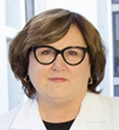ARCHIVED: NOT AVAILABLE FOR CREDIT
The Paris System
The Paris System for Reporting Urinary Cytology (TPS) has been developed by international group of members of the American Society of Cytopathology and the International Academy of Cytology to emphasize the goal of detecting High Grade Urothelial Carcinoma (HGUC) while minimizing the emphasis on Low Grade Urothelial Neoplasms (LGUN). Consequently, definition of the characteristics of the intermediate category of atypia aims at decreasing that category into a clinically meaningful one. Criteria for each category have been based on the best available clinical outcomes evidence. The uniqueness of the Paris System for Reporting Urinary Cytology lies in the fact that the system is based on understanding of the pathogenesis of urothelial carcinoma and recognizing two separate pathogenetic pathways; one leading to the development of a low grade urothelial neoplasm and the other leading to the formation of a high grade urothelial carcinoma, which is clinically significant and should be detected by cytology. From its inception, the system became enthusiastically accepted by cytology practitioners who recognized the significance of this more simplistic, but clinically significant, approach to urine cytology. It appears that urine cytology is no longer one of the most frustrating and difficult areas of cytology.
Originally presented on February 7, 2017, in Park City, Utah.
Lecture Presenter
 | Eva M. Wojcik, MD Chair of Pathology, Helen M. and Raymond M. Galvin Professor of Pathology & Urology |
Dr. Wojcik is a professor and chair of the Department of Pathology of Loyola University Chicago Stritch School of Medicine. She also is a professor in the Department of Urology.
Dr. Wojcik is currently the president of the American Society of Cytopathology. She was instrumental in creating the Journal of the American Society of Cytopathology, where she is associate editor. She also has served on the editorial boards of several other scientific journals.
At Loyola, Dr. Wojcik is medical director of laboratories, former director of the residency program and director of the cytopathology fellowship program.
Dr. Wojcik earned her medical degree from the Medical University of Gdansk, Poland. She completed residencies in pathology: anatomic and clinical pathology from Cleveland Metropolitan General Hospital and Wayne State University/Detroit Medical Center. She did a fellowship in pathology: cytopathology from MD Anderson Cancer Center.
Objectives
After this presentation, participants will be able to:
- Relate the relative risk of HGUC according to the results of the cytologic interpretation for each diagnostic group
Sponsored by:
University of Utah School of Medicine, Department of Pathology, and ARUP Laboratories
 Site Search
Site Search

